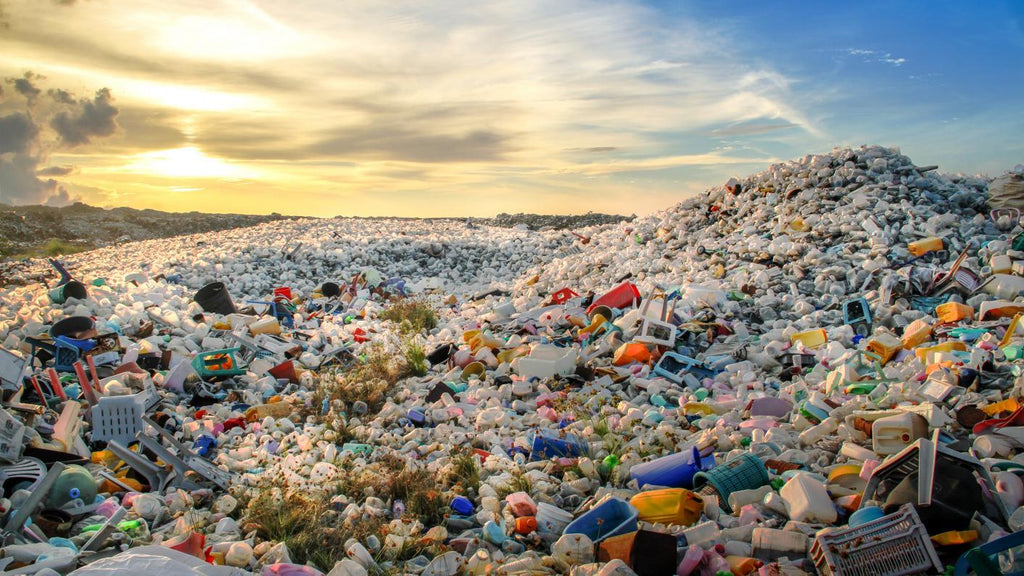What is PBAT? A Key Ingredient in Compostable Packaging

P - Who?
The 411 is that PBAT is the active ingredient in compostable packaging. It's also one of the main ingredients in our Ecomailers, aside from corn starch and PLA (a renewable bio-based plant material).
We've got everything you need to know in this blog about what it is, why it is, and how eco-friendly it is.
And if this is all sounding a bit overwhelming, never fear! We'll do our best to keep sciencey-speak to a minimum.
PBAT (or polybutylene adipate terephthalate, if you're fancy) is a fully biodegradable polymer. This just means that when it's buried in soil, it breaks down completely and leaves no toxic residues behind.
It doesn't hang around, either. PBAT takes only 6 weeks to decompose!
Think of PBAT as a kind of futuristic biomaterial.
The PBAT Origin Story
PBAT was developed to solve the environmental pollution caused by recycling conventional plastics.
Basically, TONS of wasted plastics end up being burnt or buried in land during the recycling process.
It's a bummer, because life would be way easier if recycling was a perfect solution. However, the current recycling rate is below 10% each year in Australia.
In fact, the recycling rate is so low that most of the plastic that exists today has been made in the last decade.

...sheesh.
Instead of getting recycled, PBAT-based compostable bioplastics decompose, thanks to naturally occurring microorganisms (AKA fungi, algae and bacteria).
Whether home or commercially composted, the bioplastics will break down without creating methane, or emitting any harmful toxins.
It's also the cheapest and easiest bioplastic product to make.
Sounds great... right?
It is.
However, there’s one caveat with PBAT – it still isn’t fully renewable. This is because it’s partly derived from petrochemicals (or what we commonly refer to as 'oil').
While it’s currently the best solution we have to reduce plastic waste, significant research is going into a more plant-based composition for PBAT that'll make it more renewable.
We’re closely following any developments in this space. We want to bring you products that are as sustainable as humanly possible!
Even so, it’s important to note that conventional plastics still contribute far more to fossil fuel production than using biodegradable polymers like PBAT... not to mention the plastic waste that gets left behind.
The Verdict
Compostable packaging made from corn starch, PLA and PBAT isn't a perfect solution.
But we’re getting closer to finding one. And in the meantime, this is the best weapon we have to combat the evil superpower known as plastic.
REFERENCES
Jian, J, Xianbin, Z, Xianbo, H (2020). ‘An overview on the synthesis, properties and applications of poly(butylene-adipate-coterephthalate’. Advanced Industrial and Engineer Polymer Research, vol. 3, no. 1, pp. 19-26.
Geyer, R, Jambeck, J, R, Law, K, L, ‘Production, use, and the fate of all plastics ever made’, Science Advances, vol. 3, no. 7. pp. 1-5.
Weng, Y, Jin, Yu, J, Meng, Q, Wang, L, Zhang, M. ‘Biodegradation behaviour of poly(butylene adipate-co-terephthalate) (PBAT), poly(lactic acid) (PLA), and their blend under soil conditions’, Polymer Testing, vol. 32, no. 5, pp. 918-926.























Hey Greg,
Thanks for your insightful question.
Certification is key in this matter. Unless a product holds the AS5810 certification, it won’t decompose in home compost conditions like our ecomailers do.
Items like compostable coffee cups and takeaway containers, designed for industrial composting, will break down in those specific conditions. However, there’s currently a limited number of these industrial composting facilities in Australia.
What’s crucial to note is that all certified compostable products will eventually degrade into non-toxic, worm-friendly humus in the right conditions and they won’t turn into microplastics.
Can you confirm if this (and other bio degradable plastics) just degrades down to micro plastics or do they actually break down into other substances?
I’ve read lots of these compostable plastics only work for industrial compost process not domestic.
Hey Niels! Totally agree. Compostability is a key when you are looking to build circular systems where bioplastics contribute to regeneration and resource renewability. We think compostable products, therefore, provide more value than simply biodegradable ones.
Hi Ace, I think it is important to note that biodegrability can be a good option for plastics (if needed) that are used in agricultural or other outdoors environments. But a problem is that they do not fit in a circular system where you want to reuse materials in order to save resources and energy.
Leave a comment